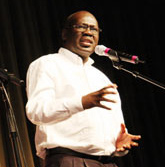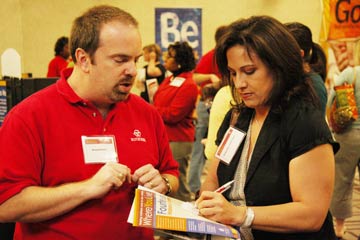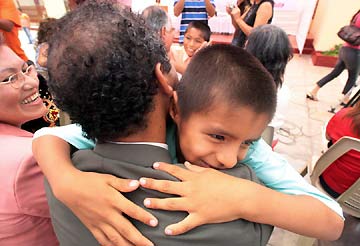Posted: 4/15/08
Bible Studies for Life Series for April 27
Exploring humility
• Genesis 32:3,6-12; 33:1-5,9-11
By Gary Long
Willow Meadows Baptist Church, Houston
Humility is an ever elusive trait, mainly because as soon as you think you’ve acquired, you just lost it. Humility is that trait of being modest, and we use it to describe a person who does not think of himself as greater or better than another person. It is the trait most idealized in the person and character of Jesus, but it also is evidenced in other figures in the Bible. One such person is Jacob, the subject of this week’s study.
This is the familiar story of the encounter between Jacob and Esau, many years after Jacob stole the blessing of Abraham from Esau. From our perspective, it is possible to miss the tension in Jacob that created the atmosphere for humility to flourish. Let’s take a look at the four phases of this story and how Jacob’s humility shaped the outcome of a situationthat could have been a family feud.
Assess the situation
Jacob had to do a hard look inside when he got the news that Esau was coming toward him. He had every reason to believe Esau would be angry with him—the last word he had on Esau was from his mother Rachel, who said, “Your brother Esau is consoling himself with the thought of killing you. Now then, my son, do what I say: Flee at once to my brother Laban in Haran. Stay with him for a while until your brother's fury subsides” (Genesis 27:43-44).
Jacob also knew from the “scouting reports” that Esau’s men outnumbered him. Clearly, Esau would be the winner of a direct battle. The reality was Jacob was in trouble. He deserved it for tricking his brother, and he knew it. A position of submission and humility was the right posture for Jacob to assume.
When we look honestly at our own lives and recognize we are in dire straits, it is good for us to do what Jacob did—assess the situation, admit where we are wrong and humble ourselves before God.
Humble yourself before God
Jacob was a trickster, this much is true. He had stolen his brother’s blessing, as well as conning him out of his birthright. But Jacob recognized his position and rightly humbled himself before God. There is deep urgency to his prayers to God, and some translations stress this more than others. The point is, Jacob is pleading earnestly with God for deliverance from his brother’s hand.
In our lives it is necessary for us to humble ourselves before God by prayerfully confessing the distance between God’s holiness and our sinfulness. Consider asking your learners to remember a time when they prayed desperately God for deliverance. Identifying with that utter dependence upon God in our everyday lives—not just in times of distress—will help us to keep humble before God, and in turn lead to lives humble before humans as well.
Humble yourself before others
Jacob took a route of humility toward his brother, and it is evident in several areas. First, he sent gifts before him to Esau. He sent them as a sign of his willingness to make peace over the past, as well as an admission of his own wrong doing in their shared history. Those gifts sent to Esau were more than just gifts—they were tokens that expressed apology, remorse and a desire for restoration.
Jacob took a route of humility toward his brother in the language he uses. He refers to himself as “your servant” and he refers to Esau as “my lord.” He is making it clear that not only does he desire to make things right with his brother, but that he sees himself as the subject of his older brother.
This modest view of oneself is rather uncommon in modern American culture. Most of your learners will be more acquainted with tactics used socially to communicate “I am most important” or “I have power and influence.”
Rather than bluffing his way through on an image of power—like so many Americans who spend frivolously to impress others—Jacob simply presented himself as who he was.
Acknowledge God’s role
As they made peace, Esau essentially compliments Jacob for all the wealth he has acquired. Jacob, however, deflects the comment and points to God as the source of his wealth and blessings. This kind of godly humility is an essential element in the spiritual growth of a maturing Christian.
To recognize the graciousness of God in our lives also is essential to a sense of self-worth. Jacob knew he was a trickster, but he also had a strong sense of God’s provision and strength as God blessed him. While he was humble, he also recognized God cared for him and provided great material blessing to him.
Similarly, Christians recognize we are sinful and broken, but we also rejoice in the fact this is not the end of the story. God cared for Jacob even though he was sinful, and God cares for us in the same way.
In recognizing our position as blessed people, it is even more vital we learn from Jacob the notion of sharing our blessing with others. Even though Esau essentially said, “You don’t have to give me these gifts,” Jacob wanted to give them out of a desire to share God’s blessing with Esau.
The bottom line in this lesson is to help your learners see pride easily overcomes humility and that only a daily walk with God—that is patterned after Jesus—can help us bridge the distance between reality and the goal of humility.
Bonus teaching idea
Try to find a painting, photo or portable sculpture that expresses an artist’s view of humility. A quick Google search of images of humility will give you many options to share. Print out a half dozen and ask your learners to choose one they think best depicts humility as they understand it. Do this before your lesson, and then ask them after the lesson if they’d make the same choice.
News of religion, faith, missions, Bible study and Christian ministry among Baptist churches, in Texas, the BGCT, the nation and around the world.




